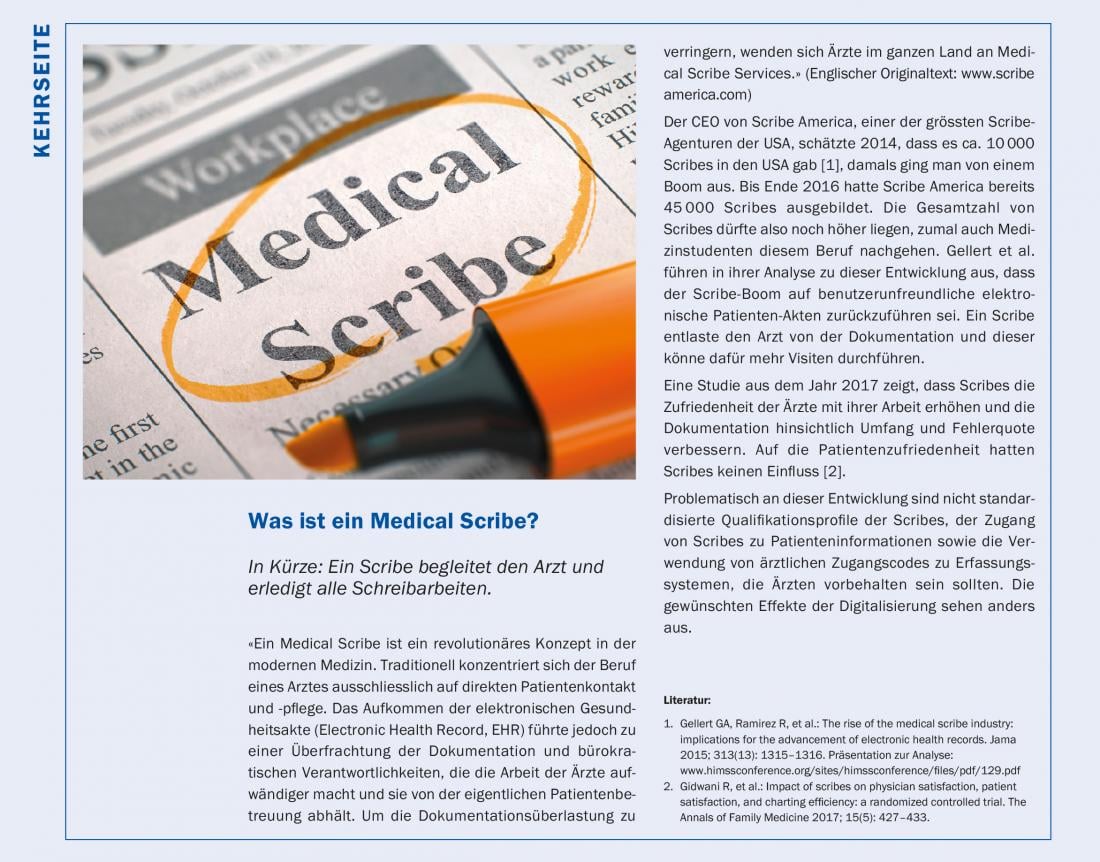The EPD is to be introduced in Switzerland by 2020. In Germany, the Swiss eHealth strategy serves as a role model. However, there were critical voices at the eHealth Forum 2018 in Bern: The success of the EPD also depends on a corresponding business transformation.
While Germany waited and possibly still waits for the Grand Coalition to act, various healthcare institutions are pursuing their particular interests in initial developments of an electronic patient record outside specific regulatory requirements on architecture, interoperability and data protection. On the occasion of the Connecting Healthcare IT (conhIT) conference in Berlin in April, Jens Naumann, Chairman of the German Federal Association of Healthcare IT (bvitg e.V.), once again called on politicians to outline a national eHealth target picture on behalf of the healthcare IT industry. “Such a target picture should be developed in a politically moderated process across ministries and sectors, and a national eHealth strategy should then be derived from it, resulting in a concrete action plan,” says Naumann. The exemplary nature of the Swiss eHealth strategy was repeatedly referred to in the discussions on the EPD. Yvonne Gilli, MD, a member of the FMH Central Board, recalled from the Swiss experience that a benefit-oriented, step-by-step roll-out of the systems had greater chances of adapting to change as well, because: “The introduction of an electronic record is not only a technical issue, but above all a cultural one.” This is according to the results of a Marburger Bund survey (four-week online member survey in September 2017 by the Marburger Bund*) an important reminder.
Learning from mistakes in economization
“When you hear doctors talk about digitization today, it’s clear that mechanization is what makes medicine as we practice it today possible in the first place. But if we look at real life in practices and hospitals, digitization is understood to mean, for example, scanning reports and then printing them out and faxing them to be passed on. In hospitals, too, many colleagues perceive digitization as a complication of their work, not as a relief, because the hospital systems served mainly administrative purposes, but not to support patient care,” said Franz Bartmann, MD, Federal Medical Association of Schleswig-Holstein (Germany), describing his experience. “The medical profession has made serious mistakes over the last ten to twenty years. It has treated digitization rather stepmotherly and has only passively negated certain developments, so that it then also had no say in them. I am talking, for example, about the economization of medicine. The disadvantages of this economization could possibly have been prevented with more active participation,” said Peter Bobbert, MD, of the Marburger Bund, in self-criticism at the presentation of the survey.
Thus, the paperless hospital could not be reported in the survey result either. Just 30% of respondents said they had enough computers at work. 69% of physicians stated that digital rounds do not occur. The paper form is still present, he said. Just 6% of responses indicated sufficient support for IT requirements, and only 11% of respondents described their systems as user-friendly. Nevertheless, almost 40% derive a benefit from digitization in terms of acceleration and simplification, and 46% said that the quality of physicians’ work is improved. This explains the optimistic attitude of the majority of physicians toward digitization: as many as 80% of the nearly 1,800 hospital physicians surveyed see opportunities in digitization for improving physicians’ work.
The Marburger Bund rejects the development of isolated technical solutions, as well as the existing solutions of the health insurance companies – a lack of standardization leads to compatibility problems, additional expenses and communication difficulties, all of which are undesirable effects. “Humanity has been significantly degraded in the economization of medicine. Doctor-patient contact is no longer as intensive as it was twenty years ago. The time gained through digitization should not be pocketed as efficiency gains, but should benefit humanity in medicine and the patient,” says Bobbert.More benefits through the EPD – a manifesto
The eHealth Forum in Bern in March provided an empirical foundation rather than a declaration of intent. About 1000 visitors exchanged knowledge, insights and tips around the acute topic of EPD introduction.
Dr. Roland Naef, Head of ICT Medical Applications and Services, University Hospital Zurich, shook up potential satisfaction with the EPD status quo with his transformation experience of the IT specialist in the hospital context. The implementation of the EPD as a compliance project, i.e. the mere fulfillment of legal requirements, is a rather pointless undertaking from an economic point of view, according to Naef’s assessment. Without business transformation, an electronic record would hardly bring any benefit, despite the basic investment of several million francs (example: University Hospital Zurich). Data management must be integrated with the workflows and information needs of providers and patients, he said. For example, multi-page documents on the screen are hardly ever read in the hectic daily routine of a clinic. Or fitness apps: It should be possible to integrate the data from these apps into the EPD – a clear added value for doctors and patients. If anything is to be achieved in business terms, structured data must be transported in addition to documents, urged Naef, who presented his “manifesto” on the subject, a call to EPD stakeholders to derive more benefit from EPD:
- Patients should look for open data standards in their apps and also when choosing their EPD portals.
- Providers should look for open data exchange standards and strive for deep workflow integration to keep the number of logins and apps compact for patients and referring physicians.
- Technical service providers and platform providers should refrain from monopolies, but strive for integration into existing ecosystems.
- Data privacy advocates are being urged to allow a centralized, secure MPI (Master Patient Index = mapping of a patient’s identities across systems). Only in this way can the automation of processes be driven forward.
- Current guidelines provide for the management of MPIs within the parent companies. A central register would contradict legal data protection requirements.
- Legislators and federal agencies should follow up on the specification of EPD content: Digitization should be carried out with structured and uniformly classified data and not only with documents. This is the only way to advance personalized medicine in Switzerland. Financial resources for cost-intensive projects such as the Swiss Personalized Healthcare Network (SPHN, www.sphn.ch) initiative could thus be allocated to other meaningful projects. As part of this project, unstructured data is classified, among other things, and then made available for research purposes in a data warehouse in an anonymized form that complies with data protection regulations.
SWISS eHealth Forum
Together with the Swiss eHealth Forum and the Swiss eGovernment Forum, the lnfoSocietyDays, founded in 1998, form a community platform for innovation and change in the information society. Every year, around 1000 interested parties from the healthcare sector and administration meet in Bern to discuss new trends, challenges and solutions. The Swiss eHealth Forum is aimed at leaders and professionals in the Swiss healthcare sector who are concerned with the challenges and opportunities of digitization in healthcare.
More information on the web:
www.e-healthforum.ch
Connecting Healthcare IT (conhIT, new DEMEA)
conhIT is aimed at decision-makers in IT departments, management, medicine and care. The conhIT, which was initiated in 2008 by the Bundesverband Gesundheits-IT – bvitg e.V. – as the industry meeting place for healthcare IT, is one of Europe’s most important events for IT in the healthcare sector with over 500 exhibitors and around 9500 visitors.
The conhIT is organized by the German Federal Association of Health IT bvitg e.V. in cooperation with the industry associations GMDS (German Society for Medical Informatics, Biometry and Epidemiology) e.V., BVMI (Professional Association of Medical Informatics) e.V. and with the content-related cooperation of KH-IT (Federal Association of Hospital IT Managers) e.V. and CIO-UK (Chief Information Officers – University Hospitals).
New – since June 15, 2018 – ConhIT is called DEMEA(Digital Medical Expertise & Applications).
More information on the web:
www.health-it-portal.de
www.demea.de

HAUSARZT PRAXIS 2018; 13(6): 38-40











